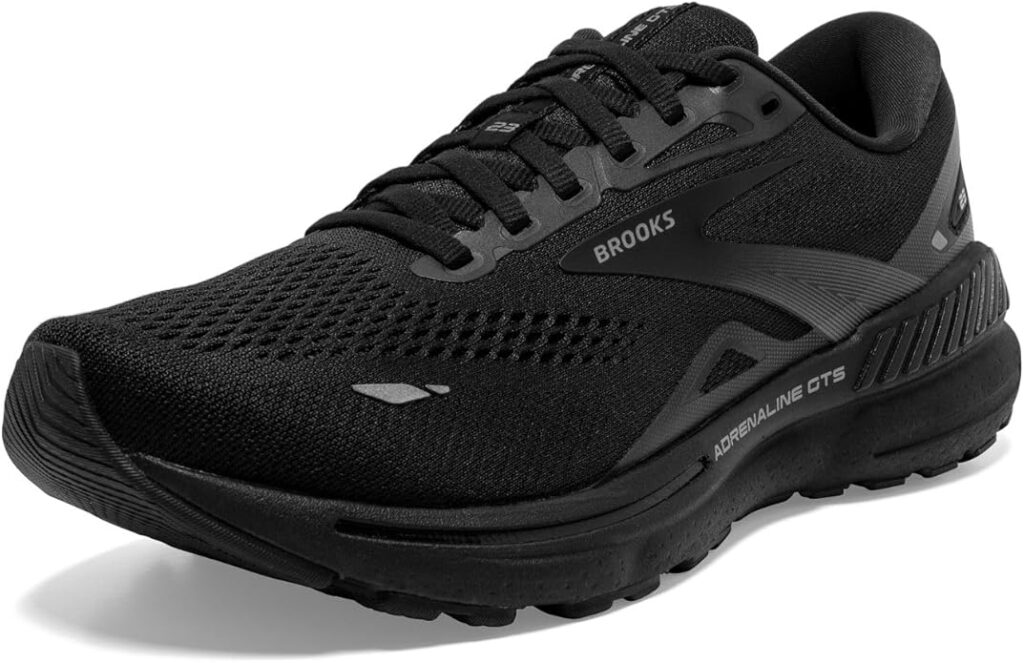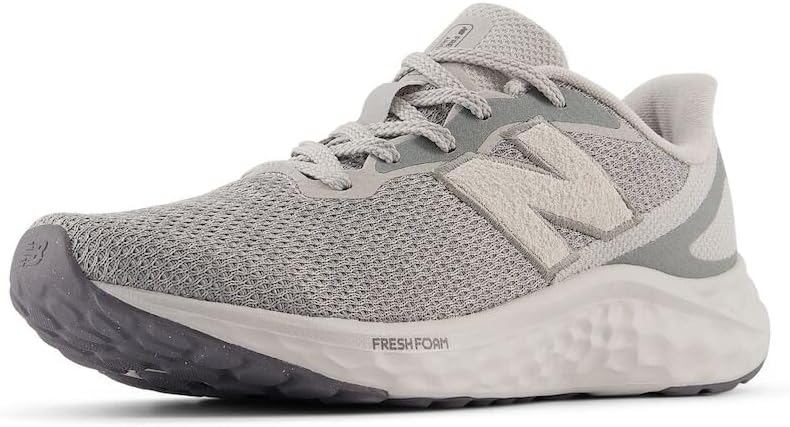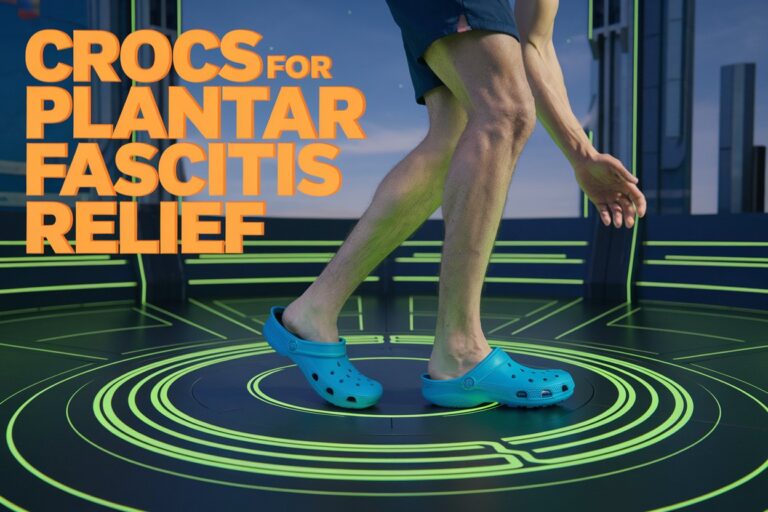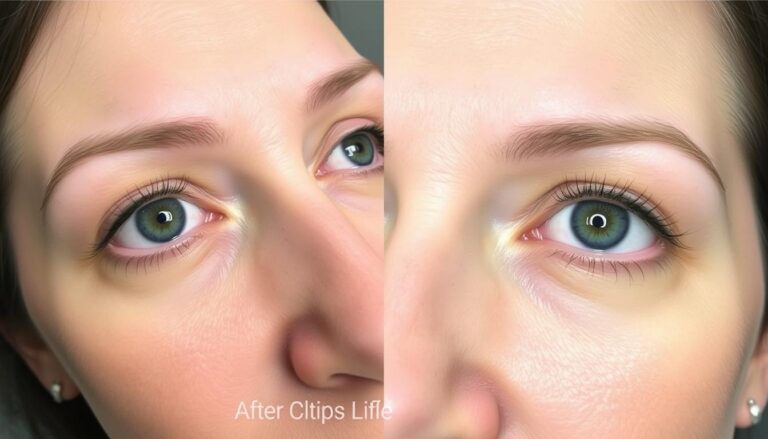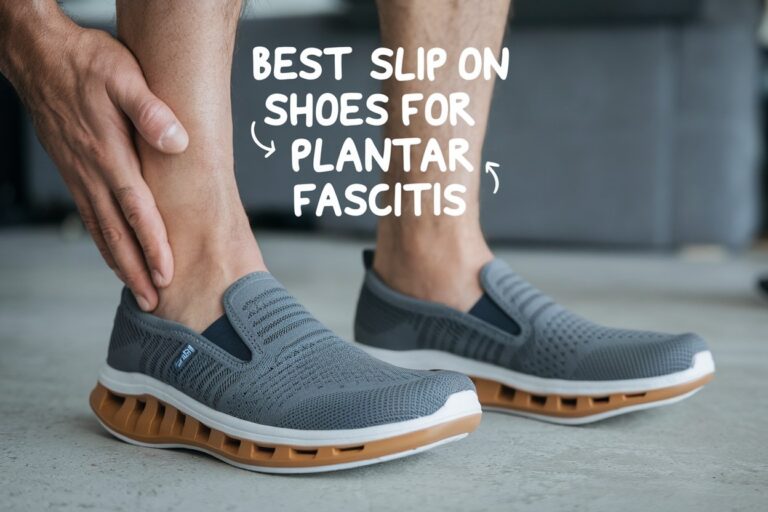Best Plantar Fasciitis Sneakers for Relief

Imagine waking up one morning, stepping out of bed, and feeling a sharp pain in your heel. This pain spreads up your foot, marking the start of dealing with plantar fasciitis. With about 1 in 10 people facing this issue, the right shoes are key to easing heel pain. Finding the best sneakers for plantar fasciitis can make your day much more comfortable.
Experts tested 25 pairs of sneakers, loafers, and mules to find the best for plantar fasciitis footwear. The Asics Gel-Venture 9 running shoes stood out as a top pick for comfort and support. These sneakers, along with others, come in various sizes and widths. This makes it easier for everyone to find the right fit for relief. Choosing the right shoes not only relieves pain but also prevents further foot damage.
Table of Contents
Understanding Plantar Fasciitis
Plantar fasciitis is a common foot problem. It happens when the plantar fascia, a tough tissue at the foot’s bottom, gets inflamed. This leads to a lot of heel pain, making it a top reason for foot pain in many people.
It often starts from overusing the foot, wearing the wrong shoes, or having foot issues like flat feet or high arches. Being overweight can also make it worse by putting more stress on the plantar fascia.
Symptoms include sharp pain in the heel, tenderness on the foot’s bottom, and trouble bending the foot. These problems get worse when you move around or stand for a long time. To feel better, rest, use ice, stretch, and wear special shoe inserts are recommended.
Stopping plantar fasciitis before it starts is key. This means staying at a healthy weight, wearing shoes that support your feet, and slowly upping your exercise level. Doing regular stretches and strengthening exercises helps keep the plantar fascia strong and flexible.
Here’s a quick guide on what to do and what to avoid with plantar fasciitis:
| Key Factor | Recommendation |
|---|---|
| Overuse | Rest and avoid strenuous activities |
| Foot Shape | Consider custom orthotics or supportive shoes |
| Weight | Maintain a healthy weight to reduce stress on the feet |
| Footwear | Choose shoes with cushioning and proper arch support |
| Activity Level | Gradually increase exercise intensity to prevent injury |
| Ice Therapy | Icing the foot for 15-20 minutes multiple times daily |
Knowing what causes plantar fasciitis helps pick the right shoes for healing and comfort. If heel pain doesn’t go away, seeing a professional is key. They can give you specific advice and treatment to help manage the condition.
Symptoms of Plantar Fasciitis
Plantar fasciitis is a common condition that causes foot pain and heel discomfort. People with this condition often feel a sharp, stabbing pain at the heel’s bottom. This pain is usually felt in the morning or after sitting for a long time.
As the condition worsens, the pain gets worse during activities that involve standing or walking. Some may feel an ache in the heel or arch when pressure is applied. This ache can also get worse with certain movements, like bending the toes.
Common risk factors for getting plantar fasciitis include:
- Sudden increases in physical activity or exercise intensity
- Standing or walking for extended periods on hard surfaces
- Poor footwear that lacks proper cushioning and support
- Foot structural issues such as flat feet or high arches
- Obesity or excess body weight
Long-term heel pain can lead to other problems, like knee pain. It’s important to recognize these symptoms early. Getting the right treatment and footwear can help. Recovery can take several months to a year if treated early.
| Symptom | Description |
|---|---|
| Heel Pain | Sharp, stabbing pain upon rising or after long sitting periods. |
| Morning Discomfort | Increased pain following inactivity, often easing after some movement. |
| Arch Pain | Discomfort felt along the arch, exacerbated by certain activities. |
| Pain with Activity | Pain becomes more noticeable during walking, running, or standing. |
What to Look for in Plantar Fasciitis Sneakers

Choosing the right sneakers for plantar fasciitis means knowing what features to look for. These features help with relief and comfort. Since the wrong shoes can make heel pain worse, picking the right ones is key.
Key attributes to look for include:
- Stable and wide soles: A wider base helps with balance and support, which is important for those with plantar fasciitis.
- Ample cushioning: Sneakers should have a lot of cushioning. They should have at least 30 mm of heel stack height and a heel-to-toe drop of 8 mm. This helps absorb shock and eases foot strain.
- Firm heel counter: A supportive heel counter is crucial. It should pass the manual squeeze-and-push test, scoring at least 3, to ensure it offers enough stability.
- Spacious toe box: Having enough room for the toes prevents extra pressure and discomfort when moving.
- Arch support: Choose shoes that give good arch support to meet the foot’s unique needs.
Avoid minimalist shoes as they can cause more discomfort and pain. Go for shoes that are known to help with plantar fasciitis issues. Research shows that 86% of people found supportive shoes helpful all day. The right shoes can really help with recovery and improve life quality.
Importance of Arch Support in Footwear
Arch support is key for shoes that help with plantar fasciitis. It spreads pressure evenly across the feet, making them more comfortable. This also helps with posture and balance.
People with plantar fasciitis find relief in shoes with good arch support. This support prevents plantar fasciitis by shielding the feet from daily impacts. It also makes shoes last longer and keeps the feet healthy. By easing pressure on sore spots, arch supports help with heel and ball pain, offering relief beyond the feet.
Studies show that strong arches help prevent long-term foot problems. They keep the feet stable and balanced, which is good for a healthy life. Arch supports fill in arch gaps, making the feet more stable and preventing injuries like fallen arches.
Feet come in different shapes, like normal, flat, or high arches. Each needs a specific level of support to fix issues like overpronation and muscle pain. When picking shoes for plantar fasciitis, consider the shoe type. Custom insoles or orthotics can make shoes more comfortable and prevent future foot issues if they fit right.
Adding arch support to shoes helps people with foot problems and keeps the feet, legs, and back pain-free. It keeps the body aligned right, making for a more active and comfy life.
Best Plantar Fasciitis Sneakers for Everyday Use
Finding the right sneakers is key for those with plantar fasciitis. A good pair offers great support, cushioning, and durability. This helps with comfort and reduces pain from this common foot issue. Here are our top picks for sneakers that help with plantar fasciitis and make daily activities easier.
Top Choices for Everyday Comfort
When picking sneakers, look for ones with good arch support, shock absorption, and lightweight materials. Here are our top choices:
- Orthofeet’s Coral Stretch Knit Shoe – Rated 5/5, known for its outstanding comfort and support, especially for wider feet.
- ASICS’ Gel-Venture 9 – This shoe also received a 5/5 rating and offers a neutral arch design, making it ideal for a variety of foot types.
- WalkHero’s Supportive Non-Slip Walking Shoes – With a high rating of 5/5, this budget-friendly option combines affordability and comfort for daily wear.
- New Balance’s Fresh Foam X 880v13 – A great choice for active individuals, scoring 4.9/5, perfect for outdoor walking workouts.
- Vionic’s Tokyo Sneaker – Crafted specifically for those with flat feet, this model efficiently manages discomfort.
Brands Known for Quality
Choosing from reputable brands ensures your shoes are durable and effective. Brands like Orthofeet, ASICS, and New Balance are known for their quality. They offer shoes that meet the needs of those with plantar fasciitis. Sales can make these sneakers more affordable; for example, a pair that was $140.00 can now be found for $105.00, a 25% discount. A 30% reduction on sneakers that were $70.00 makes them just $49.00, a great deal for those on a budget.
For more tips on fitness, including exercises to prevent plantar fasciitis, check out resources like fitness for men. A routine that includes stretching and strengthening exercises is key to preventing plantar fasciitis.
Best Plantar Fasciitis Sneakers for Running
Finding the right shoes is key for runners with plantar fasciitis. It’s important to focus on comfort and support when picking shoes. Look for shoes with good shock absorption, flexibility, and arch support. We’ll look at these features and suggest some top sneakers for this condition.
Key Features for Running Shoes
When picking shoes for plantar fasciitis, keep an eye on these features:
- Heel Drop: A heel drop of at least 8 mm helps reduce strain on the plantar fascia.
- Midsoles: Choose shoes with a hardness of 20 HA for better cushioning and support.
- Torsional Rigidity: Aim for a rating of 3-5 for stability during your runs.
- Heel Counter: A stiff heel counter with a rating of 3-5 supports the sensitive heel area.
- Toe Splay: Wide or extra-wide shoes allow for natural toe movement and splaying.
Top Rated Running Sneakers
Here are some top picks for plantar fasciitis running shoes:
| Sneaker | Heel Drop | Weight (Pair) | Price |
|---|---|---|---|
| Brooks Glycerin GTS 20 | 10 mm | 9.4 oz | $160 |
| On Running Cloudsurfer | 10 mm | 8.64 oz | $140 |
| Brooks Ariel GTS 23 | 12 mm | 10.7 oz | $160 |
| ASICS Women’s Gel-Venture 9 | – | – | $70 |
| New Balance Fresh Foam X 1080v13 | – | – | $150 |
| Mizuno Wave Inspire 19 | – | – | $135 |
These sneakers offer special benefits for those with plantar fasciitis. They make sure your runs are comfy and pain-free.
Supportive Shoes for Plantar Fasciitis
Finding the right shoes is key for those with plantar fasciitis. This issue affects about 1 in 10 people at some point. Wearing shoes made for plantar fasciitis can help ease the pain. In fact, 80% of cases get better in a year with the right treatment, including the right shoes.
Shoes made for plantar fasciitis can cut down strain on the metatarsals by half. This can help avoid making the symptoms worse. People wearing shoes with good arch support often feel 30-50% less heel pain. Brands like The Walking Company offer shoes that are 70% successful in making people feel comfortable and supported.
It’s important to look at the heel support in shoes. Experts say heels with a 4 to 8mm drop are best. Shoes with good cushioning help absorb shock, which can lessen heel pain. Making sure the shoe fits right, leaving a thumb’s width from the longest toe to the shoe’s end, is key. Using orthotic insoles in these shoes can cut down on symptoms by 65% for those prone to plantar fasciitis.
Switching to supportive shoes helps 9 out of 10 people feel better. The market for these shoes is over $1 billion worldwide. With options like Hoka’s Bondi 8 or New Balance Fresh Foam X 880v14, there are many shoes designed to be comfortable and improve mobility.
| Shoe Model | Type | Price | Discount |
|---|---|---|---|
| Hoka Bondi 8 | Best Overall Support | $170.00 | 15% off ($144.00) |
| New Balance Fresh Foam X 880v14 | Walking | $140.00 | 25% off ($105.00) |
| Ortho Feet Stretch Knit | Arch Support | $105.00 | 30% off ($73.50) |
| Asics Court FF3 | Tennis | $85.00 | No discount |
| Olukai Ohana | Flip Flops | $80.00 | No discount |
Buying supportive shoes is a good step towards managing plantar fasciitis. For more help with mental health, check out online resources. The right shoes and support can help you recover from plantar fasciitis.
Comfortable Sneakers for Plantar Fasciitis
Finding the right footwear is key for those with plantar fasciitis. Sneakers made for this condition can greatly improve comfort and mobility. They offer support and comfort, easing foot pain.
Materials that Enhance Comfort
The materials used in shoes are vital for comfort with plantar fasciitis. Breathable fabrics keep your feet cool by allowing air to flow. Cushioned insoles soak up shock, making every step easier. Durable outsoles help keep your feet in the right position.
Here are some sneakers worth considering:
| Shoe Model | Price | Heel-to-Toe Drop | Arch Support Level | Cushioning Level |
|---|---|---|---|---|
| Reebok DMX Comfort + | $90 | 10 mm | Yes | EVA foam |
| Asics GT-2000 12 | $140 (at Asics), $110 (Amazon, Zappos) | 8 mm | High | Medium |
| Hoka Clifton 9 | $145 | 5 mm | Medium | High |
| Hoka Speedgoat 5 | $155 | 4 mm | Medium | Moderate |
| Brooks Adrenaline GTS 23 | $140 (Amazon) | 12 mm | High | Low |
| New Balance Fresh Foam X More v4 | $150 (New Balance), $112 (Amazon) | 2 mm | Medium | High |
Choosing quality sneakers can boost support and satisfaction for everyday activities. The right materials can make a big difference for those with plantar fasciitis. It makes everyday tasks easier.
Plantar Fasciitis Athletic Shoes: Benefits and Features
Plantar fasciitis affects over 2 million people in the U.S. every year. For those into sports or fitness, the right shoes can really help. These shoes are made with special features for people with this condition.
Key features of plantar fasciitis athletic shoes include:
- Enhanced cushioning: This absorbs shock and minimizes ground reactive forces, essential for reducing symptoms.
- Arch support: A well-structured arch support can relieve discomfort by up to 70% and is shown to prevent the reoccurrence of plantar fasciitis in 95% of cases.
- Stability: Shoes that offer stability features help in preventing excessive foot movement, contributing to overall foot health.
- Proper fit and width: A shoe that fits well without being too tight can greatly reduce the pain associated with plantar fasciitis.
Choosing the right sports shoes helps with pain and has many benefits. About 85% of people feel better with the right shoes. Up to 90% see relief in three months if they switch to the right shoes.
Brands like Hoka and New Balance offer great options for plantar fasciitis. The Hoka Bondi 8 has a cushioned sole and balanced support. The New Balance Fresh Foam X 880v14 is great for walking.
In summary, getting plantar fasciitis athletic shoes can make a big difference. It helps with comfort and performance. This lets people keep up with their active lives while taking care of their feet.
Top Rated Plantar Fasciitis Shoes for Wide Feet
Finding the right shoes is tough, especially for those with wide feet and plantar fasciitis. Wide feet need shoes with enough toe room, good arch support, and a comfy fit to ease heel pain. The right shoes can help you stay comfortable and keep up with your daily life.
Considerations for Wide Feet
When picking shoes, keep these points in mind for wide feet:
- Toe Box Space: A big toe box is key to prevent toes from feeling squished.
- Arch Support: Good arch support spreads out your weight, easing pressure on the plantar fascia.
- Comfortable Fit: Wide feet shoes reduce discomfort and help avoid injuries.
- Cushioning: Choose shoes with soft cushioning for all-day comfort.
Recommended Wide-Width Options
Many brands have great wide sneakers for those with plantar fasciitis. Here are some top picks:
| Brand | Model | Available Widths | Price |
|---|---|---|---|
| Vionic | Tokyo Sneakers | Medium, Wide | $129.95 |
| Orthofeet | Coral Stretch Knit | Narrow, Medium, Wide, Extra Wide | $145.00 |
| Walk Hero | Comfort Shoes | Narrow, Medium, Wide | $80.00 |
| Dansko | Pace Walking Shoes | Standard, Wide | $140.00 |
Choosing the right shoes can make a big difference for those with plantar fasciitis. For more tips on finding the right footwear, check out an online resource.
Reviews of Top Plantar Fasciitis Sneakers
Finding the right sneakers for plantar fasciitis means looking at what customers say and what experts recommend. This section focuses on key reviews, showing what users think and what foot health experts say. It aims to help people pick the best shoes based on real experiences.
Customer Feedback and Ratings
Many people with plantar fasciitis find relief with certain shoes. Here are some top picks:
- Brooks Addiction Walker: Known for great support and cushioning, it’s a top choice for easing heel pain.
- New Balance 928v3: It’s great for those with overpronation because of its stability and motion control.
- Saucony Grid Omni Walker: Its responsive cushioning and supportive design are perfect for being on your feet all day.
- Hoka One One Bondi 7: With its soft cushioning and rocker sole, it’s known for reducing shock.
- ASICS Gel-Nimbus 23: Its gel technology makes it super comfy for long periods of wear.
Expert Recommendations
Foot experts often suggest shoes that offer good support for plantar fasciitis. Here’s what they recommend:
- The Brooks Adrenaline GTS 22 has the APMA Seal of Acceptance and is loved by runners for its support.
- For those on their feet all day, like retail workers and healthcare professionals, the New Balance Fresh Foam X 1080 is a top pick.
- Experts stress the need for shoes with good arch support and stability to help manage plantar fasciitis.
When looking at plantar fasciitis shoe reviews, it’s key to consider what customers say and what experts recommend. This helps in choosing the best shoes for your needs.
Finding Affordable Plantar Fasciitis Footwear
Looking for affordable plantar fasciitis shoes means finding a good balance between cost and quality. Prices can go from $199 to $399, but there are ways to get good shoes without spending a lot. Brands like Sole Bliss offer many styles, from casual to formal, with features like deep toe boxes and triple-layer cushioning for comfort.
Choosing shoes made from strong materials like premium Italian leather can make them last longer. This makes your money go further.
Look for shoes with supportive orthotic inserts, starting at about $75. These are good for both men and women and can make a big difference in comfort. Inserts like Heel Seats, priced between $24.95 and $34.95, are effective and affordable. Reading reviews can help you pick the right shoes for your needs.
Don’t forget about sandals, which can cost between $90 and $150. They offer the support needed for plantar fasciitis sufferers. By comparing features and watching for sales, you can find a good pair that fits your budget and helps with pain.
FAQ
What are plantar fasciitis sneakers?
How do I know if I have plantar fasciitis?
What should I look for in shoes for plantar fasciitis?
Why is arch support important for plantar fasciitis?
What are the best sneakers for everyday use for plantar fasciitis?
Are there plantar fasciitis shoes designed specifically for running?
How do supportive shoes help with plantar fasciitis?
What materials should I look for in plantar fasciitis sneakers?
How can I find affordable plantar fasciitis footwear?


